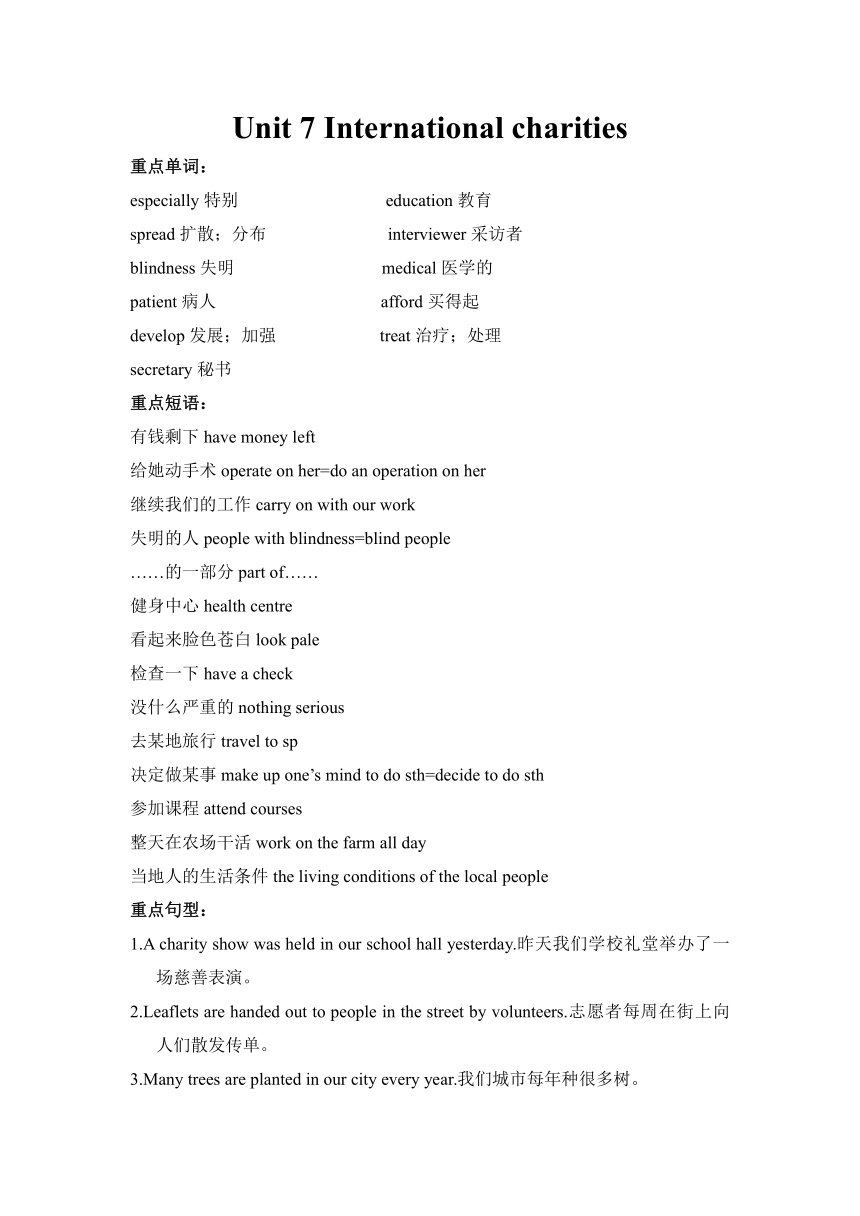Unit 7 International Charities 知识梳理 牛津译林版八年级英语下册
文档属性
| 名称 | Unit 7 International Charities 知识梳理 牛津译林版八年级英语下册 |

|
|
| 格式 | docx | ||
| 文件大小 | 18.4KB | ||
| 资源类型 | 教案 | ||
| 版本资源 | 牛津译林版 | ||
| 科目 | 英语 | ||
| 更新时间 | 2024-06-25 00:00:00 | ||
图片预览

文档简介
Unit 7 International charities
重点单词:
especially特别 education教育
spread扩散;分布 interviewer采访者
blindness失明 medical医学的
patient病人 afford买得起
develop发展;加强 treat治疗;处理
secretary秘书
重点短语:
有钱剩下have money left
给她动手术operate on her=do an operation on her
继续我们的工作carry on with our work
失明的人people with blindness=blind people
……的一部分part of……
健身中心health centre
看起来脸色苍白look pale
检查一下have a check
没什么严重的nothing serious
去某地旅行travel to sp
决定做某事make up one’s mind to do sth=decide to do sth
参加课程attend courses
整天在农场干活work on the farm all day
当地人的生活条件the living conditions of the local people
重点句型:
1.A charity show was held in our school hall yesterday.昨天我们学校礼堂举办了一场慈善表演。
2.Leaflets are handed out to people in the street by volunteers.志愿者每周在街上向人们散发传单。
3.Many trees are planted in our city every year.我们城市每年种很多树。
4.Children must be told not to play with fire.必须告诉孩子不要玩火。
5.Who was this novel written by 这部小说谁写的?
6.The thief was caught at last.那个小偷最后被抓了。
7.It’s time for lunch.=It’s time to have lunch.该吃午饭了。
8.I’m proud to be able to help people see again.=I’m proud of being able to ……
=I’m proud that I can help people……我很自豪能帮助人们重见光明。
9.She is proud of her son.她为她的儿子感到骄傲。
10.Modern medicine is developing quickly.现代医学发展得很快。
11.Many children’s lives were changed because of the war.许多孩子的生活因为战争而被改变。
12.Take this medicine after meals three times a day这药饭后服用每天三次。
13.She used to be a secretary in a big company.=She was once a…她曾经是一家大公司的秘书。
14.She doesn’t have as much money as before, but she thinks her life is more meaningful.她钱没以前多,但她认为她的生活更有意义。
16.He likes sports, especially playing basketball.他喜欢运动,特别是打篮球。
17.Many things are sold in that shop, including books.那家商店卖很多东西,包括书。
18.Many new books are sent to poor children every year.每年有很多新书被送到贫困儿童手上。
温馨提示:
1.被动语态(I)
被动语态的般现在时和一般过去时
语态是动词的一种形式, 表示的是主语和谓语之间的关系。英语中的语态有两种:主动语态和被动语态。
①当主语是谓语的执行者时,用主动语态。当主语是谓语的承受者时,用被动语态。如:
We clean the classroom every day.我们每天都打扫教室。
The classroom is cleaned (by us) everyday.教室每天都被(我们)打扫。
②被动语态的基本用法:
1. 动作的执行者是泛指或不言自明时。如
None of the books was taken away.没有一本书被拿走。
2. 在不知道动作的执行者是谁时。如:
The toy is designed for children.这款玩具是为孩子们设计的。
3.需要强调动作的承受者时。如:
My bike was repaired.我的自行车修好了。
4.出于委婉或礼貌而避谈动作的执行者时。如:
This problem was talked about just now.这个问题刚才被讨论过。
5. 在被动语态的句子中,如果我们需要指出动作的执行者,可以由by引出。如:
Mr Wu is liked by all of his students.所有的学生都喜欢吴老师。
*注意:有些动词常用被动语态。如
He was born in Nanjing. 他生于南京。
This mobile phone was made in China.这部手机是中国制造的。
*注意: ①有些动词,其主动语态形式含有被动意义。如:系动词smell、taste、 sound、feel等 。
The dish smells good.这道菜闻起来很香。
The music sounds nice.这段音乐听起来不错。
还有一些不及物动词,常用主动语态,和well、 easily等副词连用,含有被动意义。如:
read、write、 draw、sell、 wash、cook、clean等。
The books sell well.这些书很畅销。
The pen writes smoothly.这支笔写起来很顺滑。
②在感官动词和使役动词的主动语态句式中,动词不定式的to常省去,但是在被动语态中要加上to。
重点单词:
especially特别 education教育
spread扩散;分布 interviewer采访者
blindness失明 medical医学的
patient病人 afford买得起
develop发展;加强 treat治疗;处理
secretary秘书
重点短语:
有钱剩下have money left
给她动手术operate on her=do an operation on her
继续我们的工作carry on with our work
失明的人people with blindness=blind people
……的一部分part of……
健身中心health centre
看起来脸色苍白look pale
检查一下have a check
没什么严重的nothing serious
去某地旅行travel to sp
决定做某事make up one’s mind to do sth=decide to do sth
参加课程attend courses
整天在农场干活work on the farm all day
当地人的生活条件the living conditions of the local people
重点句型:
1.A charity show was held in our school hall yesterday.昨天我们学校礼堂举办了一场慈善表演。
2.Leaflets are handed out to people in the street by volunteers.志愿者每周在街上向人们散发传单。
3.Many trees are planted in our city every year.我们城市每年种很多树。
4.Children must be told not to play with fire.必须告诉孩子不要玩火。
5.Who was this novel written by 这部小说谁写的?
6.The thief was caught at last.那个小偷最后被抓了。
7.It’s time for lunch.=It’s time to have lunch.该吃午饭了。
8.I’m proud to be able to help people see again.=I’m proud of being able to ……
=I’m proud that I can help people……我很自豪能帮助人们重见光明。
9.She is proud of her son.她为她的儿子感到骄傲。
10.Modern medicine is developing quickly.现代医学发展得很快。
11.Many children’s lives were changed because of the war.许多孩子的生活因为战争而被改变。
12.Take this medicine after meals three times a day这药饭后服用每天三次。
13.She used to be a secretary in a big company.=She was once a…她曾经是一家大公司的秘书。
14.She doesn’t have as much money as before, but she thinks her life is more meaningful.她钱没以前多,但她认为她的生活更有意义。
16.He likes sports, especially playing basketball.他喜欢运动,特别是打篮球。
17.Many things are sold in that shop, including books.那家商店卖很多东西,包括书。
18.Many new books are sent to poor children every year.每年有很多新书被送到贫困儿童手上。
温馨提示:
1.被动语态(I)
被动语态的般现在时和一般过去时
语态是动词的一种形式, 表示的是主语和谓语之间的关系。英语中的语态有两种:主动语态和被动语态。
①当主语是谓语的执行者时,用主动语态。当主语是谓语的承受者时,用被动语态。如:
We clean the classroom every day.我们每天都打扫教室。
The classroom is cleaned (by us) everyday.教室每天都被(我们)打扫。
②被动语态的基本用法:
1. 动作的执行者是泛指或不言自明时。如
None of the books was taken away.没有一本书被拿走。
2. 在不知道动作的执行者是谁时。如:
The toy is designed for children.这款玩具是为孩子们设计的。
3.需要强调动作的承受者时。如:
My bike was repaired.我的自行车修好了。
4.出于委婉或礼貌而避谈动作的执行者时。如:
This problem was talked about just now.这个问题刚才被讨论过。
5. 在被动语态的句子中,如果我们需要指出动作的执行者,可以由by引出。如:
Mr Wu is liked by all of his students.所有的学生都喜欢吴老师。
*注意:有些动词常用被动语态。如
He was born in Nanjing. 他生于南京。
This mobile phone was made in China.这部手机是中国制造的。
*注意: ①有些动词,其主动语态形式含有被动意义。如:系动词smell、taste、 sound、feel等 。
The dish smells good.这道菜闻起来很香。
The music sounds nice.这段音乐听起来不错。
还有一些不及物动词,常用主动语态,和well、 easily等副词连用,含有被动意义。如:
read、write、 draw、sell、 wash、cook、clean等。
The books sell well.这些书很畅销。
The pen writes smoothly.这支笔写起来很顺滑。
②在感官动词和使役动词的主动语态句式中,动词不定式的to常省去,但是在被动语态中要加上to。
